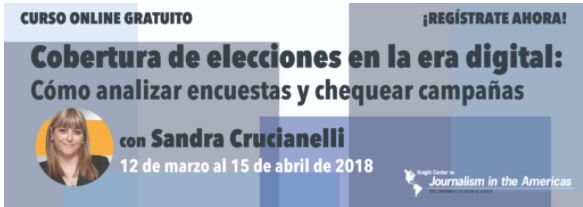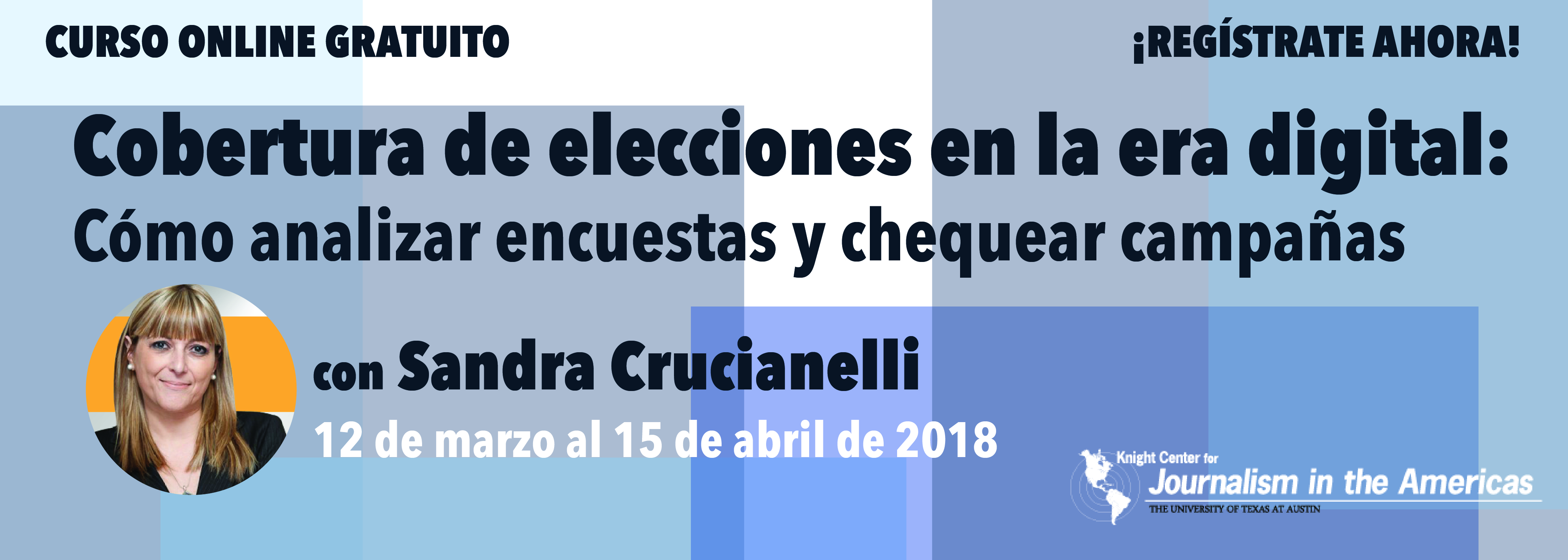
Latin America is heading to the polls in 2018.
More than 350 million voters in the region will elect new presidents this year and that means big coverage plans and long hours for newsrooms across the Americas. But, recent elections in other parts of the world have shown that the expansion of technology also presents new challenges for journalists and news consumers in election years.
To help navigate electoral polls and campaign agendas, as well as this new information environment, data journalist Sandra Crucianelli will join the Knight Center for the free MOOC in Spanish, “Election coverage in the digital age: How to analyze polls and fact-check campaigns.”

“Mathematical and inferential statistics tools will allow reporters to put electoral polls under scrutiny, detecting fraud and manipulation practices,” Crucianelli said. “I hope that journalists can develop criteria and establish work strategies for quality news coverage in the newsroom and also incorporate elements for analysis of the audience during campaign periods.”
During this five-week course, students will learn how newsrooms can better plan quality election coverage and how to interpret electoral polls. Crucianelli will also teach how to incorporate audience analysis, prepare for candidate interviews, organize debates, cover elections on social media and detect agendas pushed by political candidates.
Register now for the free MOOC, which takes place from March 12 to April 15.
“It is also important that students know the techniques to face candidates in interviews, make summaries, profiles, analysis of government plans and cross-check information, as well as organize candidate debates,” Crucianelli explained. “The journalist is the guiding thread in the construction of the civic agenda, hence the importance of this course.”
The course will include videos, presentations, readings, quizzes and discussion forums.
Crucianelli, an expert on data journalism, started training journalists as part of the Knight Center’s distance learning program in 2004. This will be the fourth MOOC she has taught for the Knight Center –her last course, “Digital Tools for Data Journalism,” attracted more than 5,000 students. Her book “Digital Tools for Journalists,” is available for free from the Knight Center in Spanish and Portuguese.
Crucianelli was awarded a fellowship from the International Center for Journalists (ICFJ), between 2012 and 2013. Crucianelli now works with the International Consortium of Investigative Journalists (ICIJ) on projects like the Panama Papers and Paradise Papers. In 2008, she founded www.SoloLocal.info, a digital news magazine for Bahía Blanca, Argentina, and is instructor of the Center for Formation in Digital Journalism at the University of Guadalajara in Mexico.
“We are happy to offer another course taught by Sandra Crucianelli, who has been an instructor of Knight Center online courses for almost 14 years and is recognized as one of the most successful and most effective journalism trainers in Latin America,” said professor Rosental Calmon Alves, founder and director of the Knight Center.
“This time, Sandra will be covering one of the most important topics for democracies in Latin America that are heading to several important elections. In the digital era, there are new techniques and skills that journalists must use to cover electoral campaigns. We are proud to offer this opportunity for free training for Latin American journalists and anyone else who wants to learn from a great instructor,” Alves said.
The course is tailored to journalists and editors at print and digital media organizations, communications professionals at public or governmental institutions or academics and researchers specializing on electoral issues. However, the course is open to anyone interested in learning the basics of how to analyze polls and fact-check campaigns.
Like all Knight Center MOOCs, this course will be asynchronous, meaning students can complete the lessons on their own time, when it’s most convenient. There will, however, be suggested deadlines to help you stay on task.
Students who successfully complete the course, including weekly quizzes and weekly participation in discussion forums, can earn a certificate of participation upon verification from Knight Center staff. The certificate, which is available in PDF format for U.S. $30, attests to participation in the online course, but no formal course credit of any kind is associated with the document.
The Knight Center for Journalism in the Americas was created in 2002 by Professor Rosental Alves, Knight Chair in Journalism at the University of Texas Moody College of Communication, thanks to generous donations from the John S. and James L. Knight Foundation. The Knight Center’s distance learning program started in 2003 and is funded in part by the Knight Foundation. In the last five years, the Knight Center’s MOOCs have reached more than 120,000 people from more than 170 countries.

Knight Center for Journalism in the Americas
300 West Dean Keeton
Room 3.212
Austin, TX, 78712
Phone: 512-471-1391
Email: journalismcourses@austin.utexas.edu